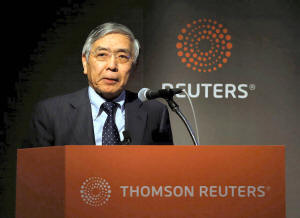|
BOJ chief Kuroda says 'no reason' to
withdraw stimulus now
 Send a link to a friend
Send a link to a friend
 [March 24, 2017]
By William Mallard and Leika Kihara [March 24, 2017]
By William Mallard and Leika Kihara
TOKYO (Reuters) - Bank of Japan Governor
Haruhiko Kuroda said there is "no reason" to raise the bank's bond yield
targets now with inflation so far from its 2 percent target, offering
his strongest denial to date of the chance of withdrawing its massive
stimulus any time soon.
The former top Japanese currency diplomat also played down the risk that
President Donald Trump's administration will lean toward excessive
protectionism since the global community, including the United States,
benefits from free trade.
While Japan's economy was slowly recovering, it still lacked enough
momentum to quickly boost inflation to the BOJ's target, Kuroda said,
adding that risks to both the growth and price outlooks were skewed to
the downside.
"There is no reason to reduce the level of monetary accommodation in
light of current economic and price developments," Kuroda told a Reuters
Newsmaker event on Friday.
"I don't think we need to raise our interest-rate targets now," he said.
"It's unclear whether inflation will hit our 2 percent target before my
term ends next April."

Japan's long-stagnant economy has shown signs of life in recent months,
with exports and factory output benefiting from a recovery in global
demand.
Core consumer prices are expected to rise in February at the fastest
pace in nearly two years, a Reuters poll showed, and many analysts
project inflation to approach 1 percent later this year.
That has led to a dramatic shift in market expectations, with a majority
of analysts polled by Reuters predicting the BOJ's next move would be to
scale back stimulus, possibly as early as the second half of this year.
Some analysts say the BOJ may be forced to raise its yield targets to
avoid ramping up bond purchases if Japanese long-term interest rates
track global bond yield rises, which are being driven by expectations of
higher U.S. interest rates.
Kuroda said the BOJ may debate raising its interest-rate targets if
Japan's inflation accelerates sharply in the future.
But he said the central bank won't increase its bond yield targets just
because overseas long-term interest rates were rising, or in response to
rises in a single price indicator.
"When deciding on monetary policy, we must look at the underlying trend
of inflation ... We won't change monetary policy just because oil price
rises push up inflation," he said.
The BOJ also sees no immediate need to scale back the pace of purchases
of its exchange-traded funds (ETFs), Kuroda added, shrugging off
speculation it could reduce buying as Japanese stock prices were on a
firm note.
"The comments confirmed our view that a hike in the BOJ's long-term rate
target is unrealistic for now," said Makoto Yamashita, chief bond
strategist at Deutsche Securities.
[to top of second column] |

Bank of Japan (BOJ) Governor Haruhiko Kuroda speaks during a Reuters
Newsmaker event in Tokyo, Japan March 24, 2017. REUTERS/Toru Hanai

Under a policy framework aimed at controlling the yield curve, the
BOJ guides short-term interest rates at minus 0.1 percent and
10-year government bond yields around zero percent via aggressive
asset purchases.
PROTECTIONISM RISK EXAGGERATED
Kuroda said the global economic recovery is gaining momentum with
U.S. business confidence improving sharply on hopes for
growth-boosting policies from Trump's administration.
"It's obvious the BOJ should maintain the current yield curve and
make the most of improvements in the global economy," Kuroda said,
stressing his resolve to maintain an ultra-easy bias even as the
U.S. Federal Reserve hikes interest rates.
Underscoring Kuroda's optimism, Japanese manufacturers' business
confidence hit a three-year high in March.
But a business survey suggested manufacturing activity expanded at a
slightly slower pace in March than in February, highlighting the
fragile nature of the recovery as fears of Trump's "America first"
streak cloud the outlook.
G20 finance leaders dropped a pledge to keep global trade free and
open at last week's gathering in Germany, acquiescing to an
increasingly protectionist United States.
Kuroda, who attended the G20 gathering, said it was hard to judge
Washington's stance on trade yet with no concrete policy steps taken
by Trump's administration.


"What I can say is that the media is portraying this as a U.S. shift
to protectionism the G20 was forced to accept," which was not the
case, Kuroda said.
"If you look at the contents of the G20 communique, it does not show
that we shifted to protectionism and away from free trade, or that
we accepted U.S. demands."
(Additional reporting by Stanley White; Editing by Chris Gallagher
and Kim Coghill)
[© 2017 Thomson Reuters. All rights
reserved.]
Copyright 2017 Reuters. All rights reserved. This material may not be published,
broadcast, rewritten or redistributed. |